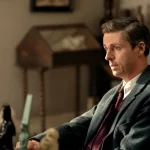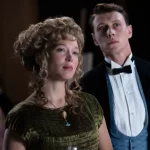Home Video Hovel: Le Week-End, by Darrell Tuffs
Roger Michell directs Le Week-End, a unique, honest, and at times, bleak portrait of love in a long-term marriage.
Le Week-End, at first, presents itself as a comedy first and foremost. During its first ten minutes, it may be easy to wrongly accuse the film as being nothing more than a simple romantic comedy, set in old age. However, the film is able to substantially exceed these expectations. Instead, blossoming into something much deeper and profound. The film constantly challenges us emotionally, not only through its central relationship, but also by way of its characters as individuals, the pleasures that bring them together, and the anxieties that tear them apart.
The film carefully unravels the relationship of Nick (Jim Broadbent) and Meg (Lindsay Duncan) as they celebrate their 30th wedding anniversary in Paris. Their reason for visiting Paris at this time is personal and significant; it was where they first fell in love, as a vibrant, and excited young couple. Now, they return in old age, hoping their young love and passion have also returned with them.
There are moments that leave the couple emotionally ignited with nostalgia, but also, of course, opposing moments, in which they start questioning their entire relationship, and asking whether love can withstand such a long stretch of time, this is where the film becomes enormously interesting. Nick and Meg are equally tempted at times by younger, more seemingly exciting people. This is contrasted with the fact that, they are each growing older, slowing down, and becoming more fragile. We see Nick awkwardly fall onto a pavement in Paris, how he struggles to get up, and how Meg reacts jokingly, as if he were young, and not so easily hurt. In one scene, after they are heard discussing their sex life, we cut to a wide city shot, with deep, heavy breathing on the soundtrack. The camera then pans down to revealed that, in fact, Nick and Meg are struggling to climb up a simple flight of stairs. On many occasions, old age is hinted at as a hidden anxiety in the minds of Nick and Meg, and when they begin to discuss these issues, their marriage is deeply tested and challenged.
In these discussions, it becomes easy to hear just how witty and intelligent the film’s script often is. The film is filled with lines of such beautifully balanced comedy and tragedy. Some lines feel like they have been lived in, or brought to the screen by the writer’s own personal life experiences. For example, at one point, Nick declares, “I’m not sure enjoyment is quite my thing, I don’t fit in. Even on my own I don’t fit in, let alone with anyone else”. For which I am sure many members of the audience would understand completely. In one scene, after Nick asks Meg why she never lets him touch her, she replies, ”It’s not love, it’s like being arrested”. So many of the film’s lines are clever, and refreshing, but hold within them, a dark and troubling tendency, one that could emotionally erupt at any moment.
Present within the film, are strong references to the French New Wave, particularly Godard. The film’s title, Le Week-End, instantly brings to mind Godard’s 1967 film, originally titled Week-End. Also present are photos of Jean-Juc Godard and Anna Karina, and strong references to Godard’s 1964 film Band of Outsiders. This includes the final scene of Le Week-End, which is sure to be a huge treat to any Band of Outsiders fan; it is also the funniest scene in the entire film.
These references partially rub-off on the film’s visual aesthetic, its colors are often muted and drawn-out, expressing the same range of mood as black and white cinematography regularly does. Static camera positions are artistically framed, leaving room for negative space, and time for the shot to linger. Moving camera positions are frequently close up, handheld, and free to wander. This all creates a film as beautifully subtle in its imagery as its script, and constructs such a well-balanced cinematic tone.
The film’s performances are never far from impeccable. Lindsay Duncan plays Meg with high levels of grace and dignity, while, at the same time, holding her back from ever fully embracing the concentrated confidence projected successfully on Meg’s surface. In Meg, we feel the fears and anxieties that come with growing older, her hidden lack of confidence, and her desperate attempts to hide it from the world. Meanwhile, Jim Broadbent plays Nick with the smallest amount of dignity possible, at one point, he says of Meg, “I cling to her like a drowning man to a shelf of melting ice”. Compared to Meg, Nick is visibly awkward, clumsy, and bumbling; projecting everything that Meg fears in old age, and becoming somewhat of an embarrassment for her. Both leads bring heart and soul to their performances, but none are quite as brilliant as Jeff Goldblum, who plays Morgan, a friend of Nick. Goldblum is first introduced towards the end of the film’s first act, and in his presence, Le Week-End suddenly benefits massively from the humorous energy and vibrancy he brings with him.
It is quite clear that, Le Week-End, plays to a certain older social demographic, but don’t let that put you off seeking out the film. Yes, the more experience you have in marriage and love, the more likely you are to appreciate the film thematically. However, it is also easy to relate with either Meg or Nick, and to the relationship problems they face. Within the film’s running time, the central couple are constantly arguing, threatening to separate, and eventually falling in love again. This may seem ridiculous, but if we look into our own relationships, is that not exactly what love is? Le Week-End reflects love as neither a disaster nor miracle, it simply is a long, and at times, bumpy road of emotional surprises.
Le Week-End is sure to exceed all expectations, and is well worth a viewing if you have yet to see it. It stands up as an honest and subtly touching story of love, its decline, and its rediscovery. The final words should be left to yet another great line of dialogue within the film, one that sums up its message perfectly. “There is more to love than loving or being loved”
DVD special features include commentary with director Roger Michell and producer Kevin Loader. Two separate interviews, one with Rodger Michell and Hanif Kureishi, the other with Jim Broadbent and Lindsey Duncan. The DVD also includes a Behind the Scenes, and an illustration gallery by Jane Webster. And, lastly, of course, the film’s theatrical trailer.
































Because of Duncan and Broadbent’s chemistry together, the movie works and feels natural. Everything else is sort of thrown in there to create tension, but when it’s just them two chatting and being together, it’s wonderful to watch. Good review.